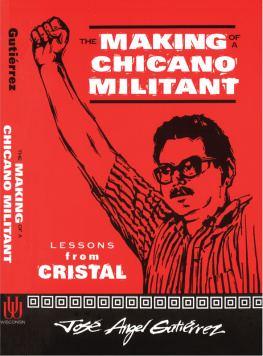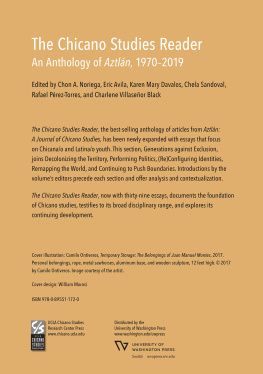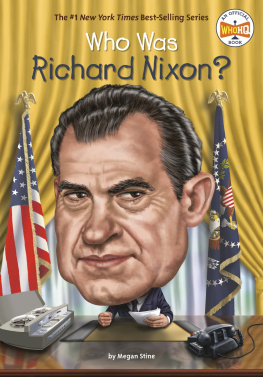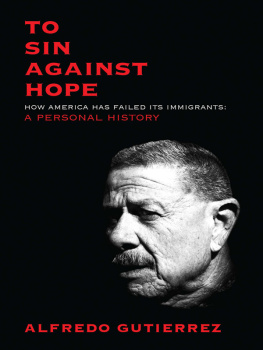A Chicano Manual on
How to Handle Gringos
Also by Jos Angel Gutirrez
A Gringo Manual on How to Handle Chicanos
They Called Me King Tiger: My Struggle for the
Land and Our Rights, editor and translator
A Chicano Manual on
How to Handle Gringos
Jos Angel Gutirrez
Foreword by Henry A. J. Ramos
This volume is made possible through grants from the Charles Stewart Mott Foundation, the City of Houston through The Cultural Arts Council of Houston, Harris County, the Ewing Marion Kauffman Foundation, and the Rockefeller Foundation.
Recovering the past, creating the future
Arte Pblico Press
University of Houston
452 Cullen Performance Hall
Houston, Texas 77204-2004
Cover art and design by James F. Brisson
Gutirrez, Jos Angel.
A Chicano Manual on How to Handle Gringos / Jos Angel Gutirrez; foreword by Henry A. J. Ramos
p. cm. (The Hispanic Civil Rights Series)
ISBN 1-55885-396-0 (pbk. : alk. paper)
1. Mexican AmericansCivil rightsHandbooks, manuals, etc. 2. Civil rights movementsUnited StatesHandbooks, manuals, etc. 3. Mexican AmericansCivil rightsAnecdotes. 4. Civil rights movementsUnited StatesAnecdotes. 5. United StatesEthnic relationsHandbooks, manuals, etc. 6. United StatesEthnic relationsAnecdotes. I. Title
II. Series.
E184.M5G868 2003
323.116872073dc21 | 2003044429 |
CIP |

The paper used in this publication meets the requirements of the American National Standard for Information SciencesPermanence of Paper for Printed Library Materials, ANSI Z39.48-1984.
2003 by Jos Angel Gutirrez
Printed in the United States of America
3 4 5 6 7 8 9 0 1 2 10 9 8 7 6 5 4 3 2 1
Table of Contents
My Chicano generation uncovered our potential power.
Your generation will realize power.
Together, lets paint the White House Brown!
To my last daughters:
Andrea Luca Gutirrez
Clavel Amariz Gutirrez
To my grandchildren:
Adrin Davison Gutirrez
Che Nicols Gutirrez
Juan Marcel Tijerina
y la Jackie Brown.
In memoriam
Gary Bigger, artist/activist
Warren Burnet, attorney
Roberto Bob Cruz, educator
Robert Donley, Chicano activist
Ignacio Fuentes, mi to
Tony Martnez, boricua actor/musician
Maury Maverick, Jr., activist lawyer
Ruben Munguia, printer/politico
Jess Chuy de la O, barrio activist
Irma Rangel, politician
Frank Trejo, journalist
Raul Villarreal, Chicano militant
Guadalupe Youngblood, Raza Unida Party and MAYO militant
R.I.P. 2002
Foreword
The 1960s and 1970s spawned some of the most significant Hispanic civil rights and social justice activities in U.S. history. During these years, Americans gained unprecedented exposure to the plight of Spanish-speaking people in the United States, through the organizing activities of Latino workers, students, artists, and community activists. The struggles for justice among Mexican Americans across the Southwest, who proudly called themselves Chicanos, were especially intense and significant. One of the leading figures of the Chicano movement of this period was Jos Angel Gutirrez. Gutirrez, then a young community and political organizer from Southwest Texas, spearheaded a new vehicle to radically alter Mexican-American political participation in the region, called the Raza Unida (United Peoples) Party. By the early 1970s, the Raza Unida Party succeeded against overwhelming odds to win key elected offices in Texas (Crystal City at the Winter Garden Area, San Antonio, Rio Grande Valley, El Paso), and Washington D.C.s Adams-Morgan Area. These victories helped to change the face of U.S. Hispanic politics in important ways.
Gutirrezs many political activities, including school protests, farm worker, marches, and student political organizing, through the Mexican-American Youth Organization (MAYO) produced a substantial body of FBI surveillance and disapproving establishment scrutiny. The electoral movement that he helped to forge ultimately waned, as so many modern American third party efforts have. Gutirrez persevered in the aftermath of the Raza Unida Partys demise, to pursue a career in progressive scholarship. He remained active in community affairs and organizing activities, developing a widely read underground book called A Gringo Manual on How to Handle Mexicans, which he self-published in the mid-1970s. Arte Pblico Press reproduced the volume in 2001 in updated form, following substantial efforts by Gutirrez to advance and expand the quality, currency, and relevance of the Manual (through constant editing, updating over the years, and one hundred new anecdotes of powerlessness).
Now the former radical activist, still a strong progressive voice in his own right, has produced an important new analogue edition, called A Chicano Manual on How to Handle Gringos. This book, presented here by Arte Pblico as part of its Hispanic Civil Rights Series, provides a roadmap to minority empowerment through an effective use of analysis, practical experience, and anecdote. In an incisive introduction, Gutirrez analyses various types of power and evaluates Chicano and Latino access to it at various levels of U.S. society. Using very plain, down to earth language and examples, Gutirrez takes pains to make his broad knowledge and experience available to everyone, but especially to those who want to be activists for themselves and their communities. Quite often, Gutirrezs voice is not only the seasoned voice of reason, but also that of humor, wry wit, and satire.
We are pleased to feature this key figure of the Chicano Movement years as a leading contributor to Arte Pblico Presss Hispanic Civil Rights Series. The series seeks to increase public knowledge and appreciation concerning Hispanic contributions to U.S. civil rights advancement in the post World War II era. With generous support from the Charles Stewart Mott Foundation, the Ewing Marion Kauffman Foundation, and the Rockefeller Foundation, the series is supporting the public dissemination and discussion of important new and revised works covering the key organizations, leaders, and movements that have shaped contemporary Hispanic social justice gains. By pointing out the many public achievements of these groups and individuals, even in the face of substantial mainstream resistance, the series aims to expand national comprehension of the strength and vitality of U.S. democratic institutions, and of the promise of our nations dramatically increasing cultural diversity.
As Hispanic Americans emerge to become the nations most populous minority group at the outset of the 21st century, many of the injustices first chronicled in Gutirrezs A Gringo Manual sadly are on the rise. Mexican origin and other Hispanic Americans suffer continuing indignities at the hands of politicians, law enforcement officials, employers, universities, the media, philanthropic grant-making organizations, and other leading institutions. Hispanics and especially newer immigrants are also increasingly subject to the nations growing incidence of racially motivated hate crime. Gutirrezs entries in


 The paper used in this publication meets the requirements of the American National Standard for Information SciencesPermanence of Paper for Printed Library Materials, ANSI Z39.48-1984.
The paper used in this publication meets the requirements of the American National Standard for Information SciencesPermanence of Paper for Printed Library Materials, ANSI Z39.48-1984.





![Daniel D. Gutierrez [Daniel D. Gutierrez] - Machine Learning and Data Science: An Introduction to Statistical Learning Methods with R](/uploads/posts/book/119585/thumbs/daniel-d-gutierrez-daniel-d-gutierrez-machine.jpg)
